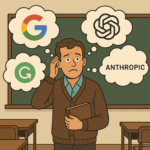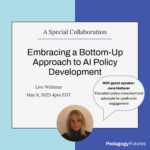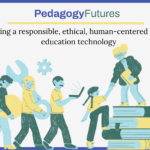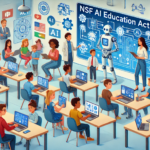The answer to this question probably seems obvious – of course!
But, I actually think the real answer is a bit more complicated.
Do I think that today’s students will likely use AI in some capacity no matter what their future career is? Yes. Do I think that they will be confronted with big questions about AI’s continued impact on their lives and societies? Definitely. Do I think that knowing how to craft the perfect prompt for a chatbot to produce their desired output will be the dominant AI-related skill in the workforce 5 years from now? Who knows.
And this gets to the root of the issue with some current discourse around teaching students how to use the AI tools that are currently available and popular. Five years ago, everyone had heard of artificial intelligence and knew that it was evolving technology, but no one was predicting the ubiquitousness of chatbots we see today. This suggests that we have no idea what the available AI-powered tools will be 5 years from now, let alone 10-15 years from now when most of today’s students will be entering the workforce.
This isn’t to say that we should be burying our heads in the sand and ignoring the impact that chatbots are having on our lives and, indeed, jobs. But, it is to say that learning to master chatbot-specific skills like prompt engineering is likely not the best use of time in today’s classrooms. That time can be better spent preparing students for a changing world and technological landscape, regardless of how AI develops over the next several decades.
So, what knowledge and skills will definitely be relevant no matter what AI tools are widely-used in future workplaces? Some basic AI knowledge, like algorithmic design and machine learning, will definitely be useful because they affect most of our interactions on the internet these days (social media, targeted ads, google searches, etc). A broad awareness of different AI-powered systems that are becoming increasingly used by the systems we depend on (facial recognition, autonomous vehicles, drones, surveillance systems, etc).
But the skills that are most needed are those that a human-centered education has always promoted. Discourse and communication skills to have constructive conversations with peers and colleagues about the ways AI is being used by employers, government agencies, and online platforms. Critical thinking and discernment skills in order to make well-informed decisions about when and how to employ AI in their own work. Problem-solving and analysis skills to be resilient against changing work requirements.
Personally, I would classify all of these skills under the umbrella of “AI Literacy,” but lately when I’ve heard people advocating for the inclusion of AI literacy in schools the skills they seem to be promoting are specific to AI as it exists today. However, in order to truly prepare our students for the future, we must assume that we’re preparing them for a world beyond chatbots and prompting.









